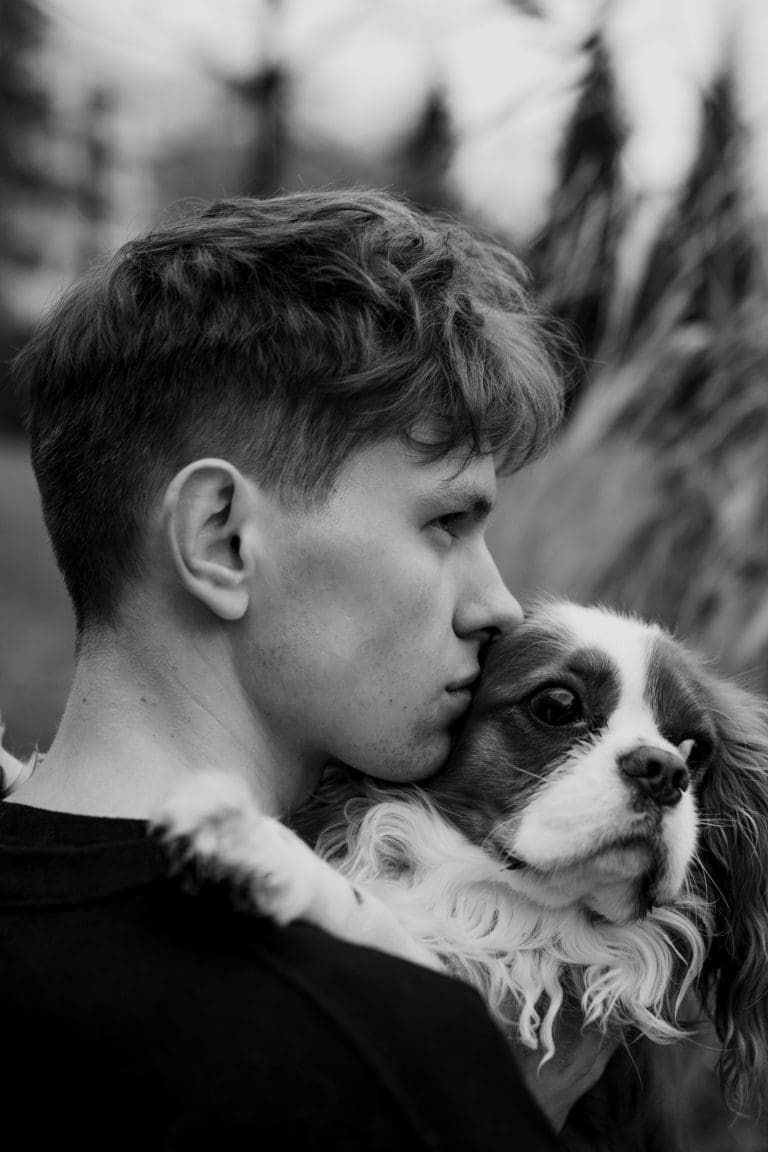Why Do Dogs Bark In Their Sleep?
Post Date:
December 10, 2024
(Date Last Modified: November 13, 2025)
Many dogs make noises while they sleep, and owners often wonder whether those sounds are normal or a sign of a problem.
What Does Barking in Sleep Look Like
Sleep-related vocalizations vary from single short barks and soft whines to low growls or chuffing sounds, and episodes can be brief or more prolonged depending on the underlying cause; owners frequently report sequences lasting up to 10 seconds during a single bout of vocalization[1].
Body language that accompanies sleep barking is often subtle: mild limb twitching, whisker movement, ear flicks, and closed-eyes postures contrast with full-body arousal and standing or pacing seen with awake reactive barking[1].
Sleep Stages and Canine Vocalizations
Dogs move through non‑REM and REM sleep like many mammals, and REM sleep is the stage most closely linked to vocal and motor phenomena because it involves active brain patterns despite reduced muscle tone; in dogs REM episodes typically begin within 10 to 30 minutes after sleep onset and recur in cycles through the sleep period[2].
Muscle atonia is a feature of REM that usually prevents large motor acts, but partial failures of atonia allow brief twitches and sounds; experimental and observational literature on domestic dogs links most short vocalizations during sleep to REM‑related activity rather than wakeful aggression[2].
Dreams, Memory, and Play Reenactment
Behavioral and neurological studies indicate that many mammals replay fragments of daytime experience during REM, and dogs commonly appear to “rehearse” chasing, play, or exploratory sequences in brief dream bouts that can produce barks or whines[1].
Controlled studies using sleep monitoring and video in canine and comparative models demonstrate that dream content tends to reflect recent salient experiences, and short wake‑like vocalizations during REM are interpreted as normal replay of learned motor patterns[2].
Neurological and Medical Causes
Not all sleep barking is benign; epileptic events can occur during rest and often differ from dream‑related vocalizations by longer duration, post‑ictal confusion, or clustered events, and idiopathic epilepsy in dogs commonly presents between about 6 months and 6 years of age[3].
Seizure clusters are typically defined as two or more discrete seizures within a 24‑hour period, and any episode with unusual sustained motor activity, difficulty waking, loss of bladder control, or prolonged disorientation should prompt urgent veterinary evaluation[3].
Medical contributors such as pain, respiratory compromise, or cardiac arrhythmias can also produce nocturnal vocalization or gasping; clinicians often evaluate hydration and metabolic status using maintenance fluid guidelines, commonly around 60 mL/kg/day for baseline needs in many adult dogs as part of systemic assessment[3].
Age, Breed, and Individual Differences
Puppies sleep substantially more than adults, and typical sleep totals for puppies are often in the range of 18 to 20 hours per day while adult dogs commonly sleep about 12 to 14 hours per day and seniors may rest 14 to 18 hours per day[4].
| Group | Typical sleep (hours/day) | Common sleep vocalizations | Notes |
|---|---|---|---|
| Puppies | 18–20 | Frequent twitching, high‑pitched whines | Developing REM architecture |
| Adult dogs | 12–14 | Occasional barks, short whines | Stable sleep patterns |
| Seniors | 14–18 | More frequent arousals, variable vocalizing | Watch for cognitive dysfunction or pain |
| Brachycephalic breeds | Variable | Noisy breathing, snorts that may accompany sounds | Upper airway issues increase nocturnal noise |
Breed conformation affects respiratory noise and arousal thresholds, and nervous or excitable temperaments show proportionally more REM‑linked twitching and vocalizing compared with calmer temperaments in observational cohorts[4].
Emotional and Environmental Triggers
Stressful events, recent excitement, or changes in routine increase the likelihood of vivid dreams and nighttime vocalizations, and many behaviorists recommend avoiding high‑arousal activities within 2 hours of planned sleep to reduce carryover activation[5].
Practical environmental measures include maintaining a stable sleeping temperature near 68–72°F (20–22°C) and minimizing sudden noises; both thermal comfort and reduced nighttime disruption are associated with fewer sleep arousals in companion animals in shelter and clinic studies[5].
Normal vs Concerning Patterns
Benign sleep vocalizations tend to be brief (a few seconds), infrequent, and followed by immediate return to normal sleep without prolonged confusion; conversely, episodes that occur repeatedly multiple times per night or that last longer than about 30 to 60 seconds are considered concerning and warrant veterinary assessment[3].
Red flags include tonic‑clonic movements, collapse, urine or fecal loss, difficulty waking, or progressive worsening over days to weeks; any of these signs should prompt expedited clinical evaluation and potentially emergency testing[3].
How Veterinarians Diagnose the Cause
Initial workup centers on detailed history and home video review, and vets commonly ask for 1–2 minute recordings of a typical event to help distinguish dream events from nocturnal seizures or other pathology[5].
Basic diagnostics frequently include complete blood count, serum chemistry, and thyroid testing, while advanced testing such as magnetic resonance imaging (MRI) or electroencephalography (EEG) is reserved for cases with suspicious focal or prolonged events; referral to a neurologist is often recommended when seizures are suspected[3].
Practical Management and Soothing Strategies
Behavioral and environmental interventions are first‑line for most benign sleep vocalizations, and consistent routines help signal down‑regulation before sleep[4].
- Establish a 30–60 minute low‑arousal pre‑bed routine that includes calm interaction and predictable cues[4].
- Schedule exercise earlier in the day with 30–60 minutes of activity tailored to the dog’s age and condition to reduce nighttime restlessness[5].
- Optimize sleeping environment: stable temperature 68–72°F (20–22°C), dim lighting, and a comfortable bed to reduce micro‑arousals[5].
- Use desensitization and counter‑conditioning for dogs whose night vocalizations follow daytime anxieties; plan multi‑week gradual behavior work rather than abrupt changes[4].
- When medical causes are identified, follow veterinarian recommendations for treatment, which may include analgesia, respiratory management, or antiseizure therapy as indicated[3].
When over‑the‑counter supplements or prescription medications are under consideration, dosing and choice should be discussed with a veterinarian because individual needs and drug interactions vary widely; clinicians often prefer objective monitoring before initiating long‑term pharmacologic therapy[3].
Monitoring and Emergency Response
When owners observe an unusual nocturnal event, capturing a clear video of at least 30 to 60 seconds is useful for clinicians because clips of that length typically show the onset, evolution, and recovery pattern needed to differentiate dreaming from seizural activity[5].
Status epilepticus is commonly defined as a single seizure lasting longer than about 5 minutes or repeated seizures without full recovery between them, and this scenario is an emergency that requires immediate veterinary attention or referral to an emergency clinic[2].
A cluster of two or more seizures within 24 hours is another threshold that typically prompts urgent evaluation because clustered events increase the risk of sustained neurologic compromise and may require hospitalization or escalated therapy[3].
Follow-up Care and Tracking
After an initial veterinary assessment, clinicians often ask owners to keep a simple seizure diary with dates, times, duration in seconds, and any preceding triggers; consistent entries for 1 to 3 months help determine frequency patterns and treatment response during follow‑up visits[3].
Objective measures such as nightly video monitoring for at least 2 weeks can reveal whether episodes are isolated dream events or part of a pattern; many clinicians recommend reviewing a minimum of several representative nights before making long‑term medication decisions[2].
Medication, Supplements, and When They’re Considered
Pharmacologic antiseizure therapy is generally considered when dogs have recurrent seizures (for instance, more than one unprovoked seizure within a 6‑ to 12‑month period) or when seizure severity poses a health risk; decisions are individualized and guided by specialist input[3].
Behavioral supplements and nutraceuticals are sometimes used adjunctively for anxiety‑linked nighttime disturbances, but dosing, efficacy, and safety profiles vary and should be reviewed with a veterinarian before use; a clinician will often trial nonpharmacologic approaches for several weeks prior to starting chronic supplementation[5].
Referral to Specialists and Advanced Testing
Referral to a veterinary neurologist is commonly recommended when episodes are prolonged, focal, or refractory to initial therapy, and advanced diagnostics such as MRI of the brain or an EEG may be proposed to locate structural or electrical causes[2].
Because access to EEG for dogs is less widespread than in human medicine, some practices rely on video‑EEG at referral centers or on trial therapeutic responses to guide management when advanced monitoring is not immediately available[1].
Behavioral Referral and Long‑Term Management
For dogs whose sleep vocalizations trace to anxiety, fear, or trauma, a certified applied animal behaviorist or a veterinary behaviorist can design a graduated desensitization plan and usually recommends structured training over 4 to 12 weeks to assess response and adjust strategies[5].
Long‑term follow‑up should include periodic rechecks every 3 to 12 months depending on severity and treatment; many patients on chronic therapy are monitored with bloodwork at least every 6 to 12 months to screen for medication effects and to confirm stable organ function[3].
Practical Owner Safety Tips
Owners who witness a prolonged nocturnal event should keep the environment safe by removing nearby objects that could cause trauma, noting the event duration with a clock or phone, and avoiding placing hands near the dog’s mouth during motor activity; after the episode, allow quiet recovery space and seek veterinary advice if recovery is prolonged or altered[3].
If a dog experiences breathing difficulties, blue mucous membranes, persistent collapse, or inability to arouse after an event, transport to an emergency veterinary facility is indicated because these signs may reflect respiratory compromise, cardiac events, or severe neurological dysfunction[2].
Summary Guidance for Owners
Brief, infrequent nighttime vocalizations accompanied by twitching and immediate return to normal behavior are most often benign and REM‑related; however, any seizure‑like signs that last beyond about 5 minutes, recur in clusters, or produce prolonged disorientation or incontinence should be evaluated urgently by a veterinarian[2].
Maintaining a sleep diary, recording clear nighttime video, optimizing pre‑bed routines and the sleeping environment, and consulting with a veterinarian when episodes increase in frequency or severity are practical steps that help distinguish normal dreaming from medical problems and guide appropriate intervention[5].
If you are concerned about a specific episode or pattern of nocturnal vocalizations in your dog, contact your primary care veterinarian for an initial assessment; they can advise whether immediate care, diagnostics, or a specialist referral is warranted based on the history and any available video documentation[3].






